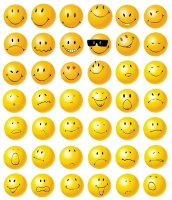Smileys - The Origin Of A New Universal Language
The Smiley Company - July 2019
 On July 17th 2019 the world celebrates World Emoji Day and this landmark is recognition of the influence and revolutionary power of Smileys and emojis. However very little is known about the early origins of these, it started in 1997 when Nicolas Loufrani, son of the creator of the first Smiley, saw the opportunity to digitalise his own Original Smiley into a variety of emotions that made sense of the pre-existing ASCII emoticons created by Scott Fahlman in 1982.
On July 17th 2019 the world celebrates World Emoji Day and this landmark is recognition of the influence and revolutionary power of Smileys and emojis. However very little is known about the early origins of these, it started in 1997 when Nicolas Loufrani, son of the creator of the first Smiley, saw the opportunity to digitalise his own Original Smiley into a variety of emotions that made sense of the pre-existing ASCII emoticons created by Scott Fahlman in 1982.
It was at this point that the first graphic emoticons were born and by 1999 Loufrani had created a Smiley dictionary with 3645 icons representing words in categories such as emotions, adjectives, verbs, objects and animals.
"My idea for smileys was simply to create a new universal language that was understandable and accessible to all, irrespective of age, language, gender, race or religion”, says Nicolas Loufrani. In the age of digital communications, Loufrani’s Smiley was the first to appear on a cell phone screen in 1996 and now over 22 years later, these are no less than 6 billion emojis (a Japanese word meaning pictogram), which are sent daily on phones and messaging devices globally.
Although it took until Apple, in 2007, started making emoji icons available only to Japanese users and then in 2010 Unicode created a standardized format for emoji and a route to bring these lovable icons to our every day life in 2010. By that time The Smiley Company had already spent 10 years turning them into an art-form.
Fast-forward to today and thanks to Unicode, the emoji revolution has fulfilled Nicolas Loufrani’s vision to create something absolutely unique, a new form of pictorial language understandable to everyone, with Smileys at their heart. In the 22 years since their creation Nicolas Loufrani and The Smiley Company’s Smileys have been featured on tens of thousands of products, produced by more than 800 licensees globally and generated billions of dollars in retail sales since their creation.
